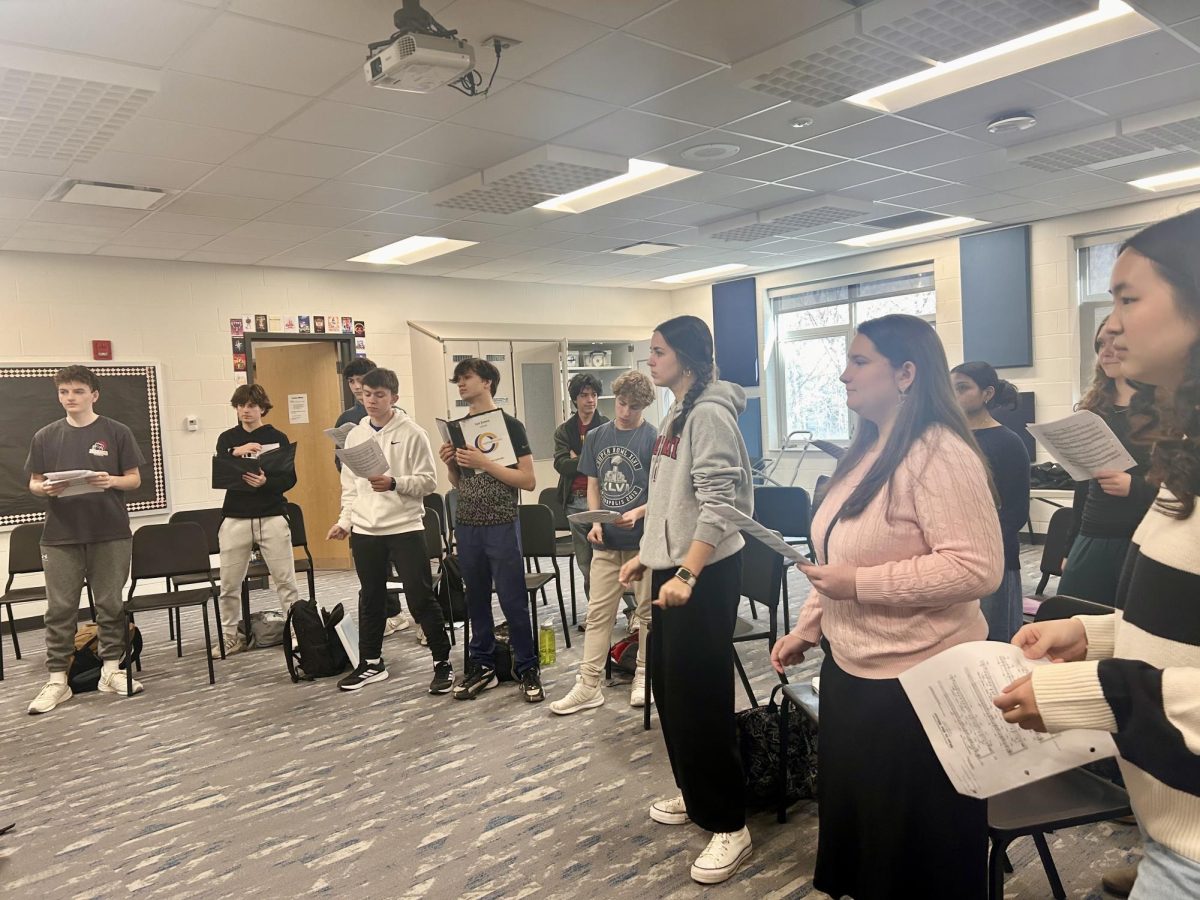A halftime speech is a motivational speech designed to inspire players and boost the team’s performance in the second half. Some of the greatest halftime speeches ever spoken contain some of the same common elements. Each was extremely persuasive and all had carefully selected “key” words in them to trigger emotions within the player and further motivate the athlete.
According to the Carmel High School Head football Coach Kevin Wright, there are certain key words that get his players riled up and ready for the game. “The key words would be finish, intensity, focus, resiliency, be physical, and play together.”
Speech 10 teacher John Love agrees but says certain phrases can be used instead of just words. “I find that using phrases such as “I believe you can… I believe in your…” can inspire people. This is very dependent on the person, however. I think that the coach/teacher has to know his or her audience,” Love said via email.
The other key aspect of an effective halftime speech is that it must also be a great persuasive speech. “First the audience must trust the speaker. Speakers develop this through ethos/personal appeal. An audience has to have “buy in” before they can be persuaded by others. A good speech is well-organized, well-written and well-delivered. A good persuasive speaker has analyzed his/her audience and has clearly determined the wants and needs of that audience,” Love said.
Through the years there have been two main types of halftime speeches: one when your team is losing and one when your team is winning. According to Wright, coaches must analyze the first half performance and then come up with the speech.
“When you are behind you have to analyze the situation and say are we behind because we haven’t played well by making mental mistakes or are we just getting outplayed. If we are ahead we always talk about forgetting the first half and pretending that the score is 0-0. We want to play like we can and we don’t want to drop off when we start to substitute,” Wright said.
Some coaches like to use silence as a way of getting their message across to their players during halftime because they think that silence is more powerful. “I think that a lot of times less is more. I will say something or I will say my point and then I just keep quiet because I want to hear from them. Some of the best speeches aren’t given by coaches, some of the best speeches are given by the players,” Wright said.
Although not compelled to give a halftime speech himself, lacrosse player and Student Body President Chris Johnson says he prefers halftime speeches from his teammates. “Yes, sometimes words from your teammates mean more than the one’s from your coaches, but both can be very motivational,” Johnson said via email.
According to Love, it is important to plan ahead as much as you can for a successful halftime speech. It requires a quick mind and a quick analysis of what the audience needs and wants.
“I think that it helps you prepare by going through your halftime speech throughout the week. I do think about my halftime speeches and the fact that every game is a little bit different. Some games are more like business trips or like a business meeting because if you do what you’re supposed to do then things will take care of themselves. You can’t give a fire and grid halftime speech every game so you have to pick and choose. It is great to get kids fired up but after that first kickoff if you get hit in the mouth very hard then all of that goes out the window,” Wright said.
According to Wright, the football team always likes to come back to three main points in its halftime speeches. “The things that we always come back to are the concepts about playing smart, playing hard, and playing together,” Wright said. “If you do those three things, then at Carmel we believe that those things win games.”































![AI in films like "The Brutalist" is convenient, but shouldn’t take priority [opinion]](https://hilite.org/wp-content/uploads/2025/02/catherine-cover-1200x471.jpg)













































![Review: “The Immortal Soul Salvage Yard:” A criminally underrated poetry collection [MUSE]](https://hilite.org/wp-content/uploads/2025/03/71cju6TvqmL._AC_UF10001000_QL80_.jpg)
![Review: "Dog Man" is Unapologetically Chaotic [MUSE]](https://hilite.org/wp-content/uploads/2025/03/dogman-1200x700.jpg)
![Review: "Ne Zha 2": The WeChat family reunion I didn’t know I needed [MUSE]](https://hilite.org/wp-content/uploads/2025/03/unnamed-4.png)
![Review in Print: Maripaz Villar brings a delightfully unique style to the world of WEBTOON [MUSE]](https://hilite.org/wp-content/uploads/2023/12/maripazcover-1200x960.jpg)
![Review: “The Sword of Kaigen” is a masterpiece [MUSE]](https://hilite.org/wp-content/uploads/2023/11/Screenshot-2023-11-26-201051.png)
![Review: Gateron Oil Kings, great linear switches, okay price [MUSE]](https://hilite.org/wp-content/uploads/2023/11/Screenshot-2023-11-26-200553.png)
![Review: “A Haunting in Venice” is a significant improvement from other Agatha Christie adaptations [MUSE]](https://hilite.org/wp-content/uploads/2023/11/e7ee2938a6d422669771bce6d8088521.jpg)
![Review: A Thanksgiving story from elementary school, still just as interesting [MUSE]](https://hilite.org/wp-content/uploads/2023/11/Screenshot-2023-11-26-195514-987x1200.png)
![Review: "When I Fly Towards You", cute, uplifting youth drama [MUSE]](https://hilite.org/wp-content/uploads/2023/09/When-I-Fly-Towards-You-Chinese-drama.png)
![Postcards from Muse: Hawaii Travel Diary [MUSE]](https://hilite.org/wp-content/uploads/2023/09/My-project-1-1200x1200.jpg)
![Review: "Ladybug & Cat Noir: The Movie," departure from original show [MUSE]](https://hilite.org/wp-content/uploads/2023/09/Ladybug__Cat_Noir_-_The_Movie_poster.jpg)
![Review in Print: "Hidden Love" is the cute, uplifting drama everyone needs [MUSE]](https://hilite.org/wp-content/uploads/2023/09/hiddenlovecover-e1693597208225-1030x1200.png)
![Review in Print: "Heartstopper" is the heartwarming queer romance we all need [MUSE]](https://hilite.org/wp-content/uploads/2023/08/museheartstoppercover-1200x654.png)


